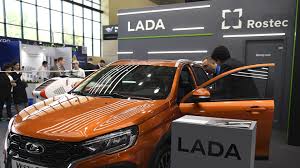
Russia’s leading automaker, AvtoVAZ, is making a bold entry into Nigeria as part of its broader strategy to expand beyond its home market. The company plans to establish a spare parts hub and service center at the Lekki Free Trade Zone in Lagos by the end of 2025, marking one of its most ambitious moves into West Africa’s largest economy.
Additionally, AvtoVAZ is in discussions with the Nigerian government to set up a local assembly plant, a step that could strengthen its foothold in a market where the demand for new cars lags behind the thriving used vehicle sector.
AvtoVAZ’s expansion is partly driven by growing competition in Russia, particularly from Chinese automakers like Great Wall Motors, which is increasing its production capacity in the country. Meanwhile, global players such as Hyundai and Renault are reportedly exploring a return to Russia following ongoing ceasefire negotiations in the Russia-Ukraine conflict.
With an eye on new growth opportunities, AvtoVAZ is targeting Nigeria’s underdeveloped but high-potential automotive sector, where annual vehicle demand is estimated at 720,000 units, yet local production accounts for just 14,000 vehicles.
AvtoVAZ is also looking to tap into Nigeria’s push for alternative fuel vehicles, aligning with the country’s strategy to promote compressed natural gas (CNG) cars as a more affordable alternative to petrol. The company will partner with a Russian engineering firm to develop a CNG conversion plant, enabling Lada vehicles to come equipped with factory-fitted or locally converted gas-powered engines.
“If you bring CNG cars to Nigeria, you don’t pay any duties, which is why we are in talks with the relevant agencies,” said Adewole Opeyemi, AvtoVAZ’s official representative in Nigeria. “Some Lada cars will arrive with factory-fitted gas-powered engines, while others will be converted locally by Russian specialists.”
AvtoVAZ has been active in Africa since 1999, shipping approximately 100,000 cars to the continent. Its first significant venture was a partnership with Egypt’s Amal Foreign Trade Company, assembling Lada vehicles at a local Suzuki plant in Cairo.
The company has since shifted its focus to expanding in Africa, with Ethiopia emerging as a key market. In 2023, AvtoVAZ signed a letter of intent with Ethio Engineering Group to begin local production of Lada vehicles.

“We are witnessing a new wave of diplomatic cooperation between Russia and African nations,” said Artem Aglichev, AvtoVAZ’s Head of Product Marketing. “Nigeria, as the region’s largest market, cannot be overlooked. Opportunities are opening up for us, and we’re ready to explore them.”
Nigeria’s automotive industry is largely dependent on imports, with used vehicles dominating the market. Local manufacturers such as Innoson Vehicle Manufacturing, Peugeot Automobile Nigeria (PAN), Coscharis Motors, and GAC Motors have made efforts to increase domestic production, but foreign brands continue to lead.
Among them, Toyota holds a 16.1% market share, thanks to its reputation for durability and availability of spare parts. Japanese brands Toyota and Honda control almost a third of the market, while South Korean manufacturers Hyundai and Kia have also gained popularity due to their modern designs and competitive pricing.
As AvtoVAZ prepares for expansion, it faces significant challenges, including regulatory requirements, competition from entrenched brands, and consumer preference for second-hand vehicles. However, the company remains optimistic about its long-term strategy.
“As a state-owned company, we fully understand the regulatory requirements and are committed to local assembly,” Aglichev noted. “Nigeria has been involved in automotive manufacturing since the 1950s, with skilled labor, strong logistics, and economic feasibility. Entering this market is a logical step, and we are moving forward with confidence.”
AvtoVAZ’s entry into Nigeria signals a potential shift in the country’s automotive landscape. By offering affordable Lada models, establishing a CNG conversion facility, and investing in local assembly, the company is positioning itself as a long-term player.
Yet, whether Nigerian consumers will embrace Lada’s low-cost vehicles remains uncertain. With an established preference for used imports and the dominance of Japanese and South Korean brands, AvtoVAZ must work to build trust and brand recognition in a highly competitive market.
One thing is clear: AvtoVAZ’s expansion marks a new chapter in Nigeria’s evolving automotive industry. How well it navigates the challenges ahead will determine whether Lada becomes a household name in Nigeria—or simply another foreign entrant struggling to break through.


